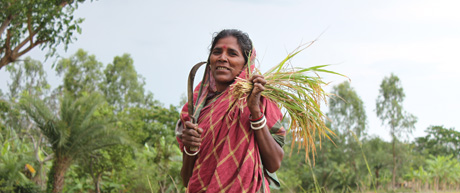Programmes

UN Women through civil society organizations undertakes policy advocacy with Planning Commission, Ministry of Rural Development and Ministry of Women and Child Development. We provide technical assistance in developing programmes aimed at economic empowerment of women.
Research has been conducted in the areas of Women, Land and Agriculture in Rural India that highlight that though 79 percent of rural women work in agriculture, they hey, however, lack control over productive assets such as land, livestock technologies, credit, finance and markets. Another research study on Mahatma Gandhi National Rural Employment Guarantee Act (MGNREGA) reveal that it has enhanced women’s say in management of household financial resources. There is, however, greater need for strengthening women’s role in local planning, assets and social audits of the implementation
In partnership with SEWA, UN Women developed skills of informal sector women workers in energy conservation in select pockets of Ahmedabad and Gandhinagar with an aim to create self employment opportunities for these women and enabling them adopt innovative ways to conserve energy through improved ventilation and use of renewable energy sources.
Most homes can reduce their energy consumption by at least 20%, and increase their potential savings by replacing incandescent light bulbs with CFLs or efficient tube lights or by adding a simple roof ventilation system which provides lighting as well as creating airflow and save money by using stoves with better thermal efficiency. Smokeless stoves can also improve health by reducing black carbon emissions and other pollutants which often get trapped inside the home. The occupational and domestic efficiency and productivity can be increased by the introduction of new sources of energy.
UN Women also implements the Safe Migration Programme to protect and promote the rights of women migrant workers in partnership with the Indian Ministry of Overseas Affairs.
Home Based Workers
There is growing unemployment in the South Asian countries, and the organized sector has been unable to provide job opportunities to a large number of persons who join the labour force each year. However, as a workforce, home-based workers are largely invisible, vulnerable to exploitation and are excluded from the benefits of economic growth.
For example: Policy advocacy on home-based workers has shown very tangible results.
- UNIFEM’s (now UN Women) support over the years has led to the establishment of national networks – Home Nets in Bangladesh, India, Nepal, Pakistan and Sri Lanka, as well as a regional network, HomeNet South Asia (HNSA), in 2007.
- UNIFEM (now UN Women) has supported HNSA and the national Home Nets in their efforts to engage in advocacy on key issues, such as social protection, fair trade practices, mutual learning and capacity development.
- In all the countries, there is now an enabling environment for policy change and dialogue on home-based workers. UNIFEM (now UN Women) is supporting the formulation of National Policies for home-based workers, and has played a key role in promoting their visibility as workers in the Census exercise.
Migration
UNIFEM’s (now UN Women) programme on empowering Women Migrant Workers (WMWs) has led to many positive results.
For example:- In Nepal, with UNIFEM’s (now UN Women) technical assistance, the Government enacted the Foreign Employment Act 2007 and Regulation 2008, which ends discriminatory provisions and adopts special measures to safeguard the rights of women migrant workers (WMW). The joint efforts of UNIFEM, the Government and Civil Society to empower WMW have contributed to rights based initiatives, including lifting of the ban on WMW, incorporation of the issue in the national agenda with right holders on board, and development of the HIV Strategy 2006-2011, which has also included the issue of migration. UNIFEM (now UN Women) is also supporting a reintegration programme, as a development alternative and the productive use of remittances through the promotion of financial schemes. Policy advocacy for engendering the draft Migration Policy is also being supported.
- In Bangladesh, UNIFEM (now UN Women), under a MoU with the Bureau of Manpower Employment and Training, has established a resource centre to disseminate information, especially for potential women migrant workers. It has also facilitated the capacity development of the media and recruiting agencies on rights based issues in the migration cycle.
- In Pakistan, opportunities exist with the National Employment Policy, where UNIFEM (now UN Women) has been, and will be providing technical assistance to the Ministry of Labour, in collaboration with ILO, on its implementation and monitoring, using participatory and catalytic approaches.
- Linkages between HIV/AIDS and migration are being explored through studies, which cover Bangladesh and Pakistan. UNIFEM (now UN Women) is undertaking a similar research in Nepal.